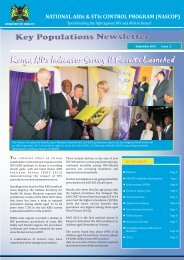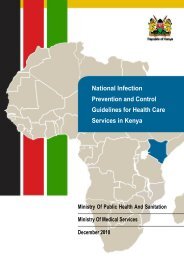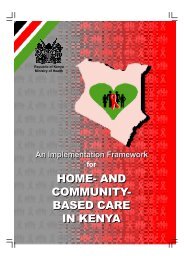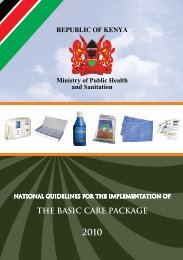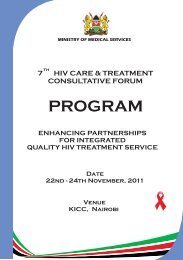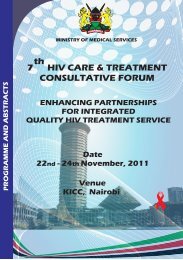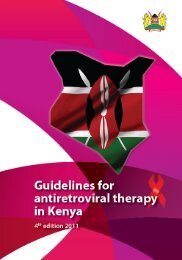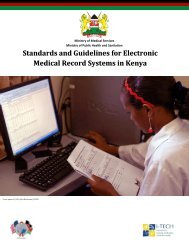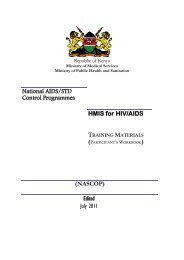- Page 1 and 2:
KAIS 2007 1
- Page 4 and 5:
P.O. Box: 9361 Code: 00202 Nairobi,
- Page 6:
KEMRIKNASPKNBSKshLLITNMCHmlμLMOMSM
- Page 10 and 11:
KEY FINDINGS: HIV PREVENTION• Amo
- Page 12 and 13:
Among HIV‐uninfected women, 71.2%
- Page 14 and 15:
Men 5.4 26.3 1.9Total 7.1 35.1 1.8O
- Page 17 and 18:
Kenya is also committed to the “T
- Page 19 and 20:
Table 1.4 Distribution of sampled c
- Page 22 and 23:
1.7 SURVEY IMPLEMENTATIONTrainingIn
- Page 24 and 25:
Data processing included a number o
- Page 26 and 27:
Characteristic 2003 KDHS 2007 KAISQ
- Page 28 and 29:
Figure 1.11 Sampled clusters and el
- Page 30 and 31:
Table 1.11c Survey response rates b
- Page 32 and 33:
Population estimates reported in th
- Page 34 and 35:
2.4 HIV PREVALENCE AMONG YOUTHFigur
- Page 36 and 37:
Figure 2.6b HIV prevalence among ru
- Page 38 and 39:
2.7 HIV PREVALENCE BY PROVINCEFigur
- Page 40 and 41:
Figure 2.7c Estimated number of HIV
- Page 42 and 43:
2.9 HIV PREVALENCE BY EDUCATION LEV
- Page 44 and 45:
Figure 2.10b HIV prevalence among r
- Page 46 and 47:
2.11 HIV PREVALENCE BY TIME AWAY FR
- Page 48 and 49:
2.13 MALE CIRCUMCISION AND ASSOCIAT
- Page 50 and 51:
Figure 2.13c HIV prevalence among c
- Page 52 and 53:
Comparison of HIV Prevalence in the
- Page 54 and 55:
3.3 SEXFigure 3.3a HIV prevalence a
- Page 56 and 57:
Figure 3.4b. HIV prevalence among m
- Page 58 and 59:
3.7 PROVINCEFigure 3.7a HIV prevale
- Page 60 and 61:
2003 KDHS 1 2007 KAIS 2Marital stat
- Page 62 and 63:
3.10 WEALTH INDEXFigure 3.10a HIV p
- Page 64 and 65:
DATA IN CONTEXT: APPROACHES TO HIV
- Page 66 and 67:
Population estimates reported in th
- Page 68 and 69:
Figure 4.3c Ever been tested for HI
- Page 70 and 71:
Figure 4.3e Ever been tested for HI
- Page 72 and 73:
Figure 4.3g Women aged 15-49 years
- Page 74 and 75:
Figure 4.4a Time since last HIV tes
- Page 76 and 77:
Figure 4.5a Reasons for not testing
- Page 78 and 79: Increasing access to HIV testing wi
- Page 80 and 81: 4.7. Gaps and unmet needs• Two‐
- Page 82 and 83: Population estimates reported in th
- Page 84 and 85: Figure 5.3b Self-reported HIV statu
- Page 86 and 87: This section examines participants
- Page 88 and 89: Figure 5.5a Knowledge of HIV status
- Page 90 and 91: Figure 5.5c Percent of partnerships
- Page 92 and 93: uninfected. A couple was considered
- Page 94 and 95: Figure 5.6c Women and men aged 15-6
- Page 96 and 97: Sexual Partners, Sexual DebutCircum
- Page 98 and 99: Figure 6.3b. HIV prevalence among w
- Page 100 and 101: Figure 6.3d. HIV prevalence among w
- Page 102 and 103: Figure 6.3f. Men aged 15-64 years r
- Page 104 and 105: In this section, “consistent cond
- Page 106 and 107: Figure 6.4c. Marital or cohabiting
- Page 108 and 109: Figure 6.5b. Young women and men ag
- Page 110 and 111: Figure 6.5d. Young women and men ag
- Page 112 and 113: Figure 6.6a. Male circumcision amon
- Page 114 and 115: Figure 6.6d. HIV prevalence among m
- Page 116 and 117: Knowledge, Attitudes and Beliefs ch
- Page 118 and 119: Figure 7.3b. Most common source of
- Page 120 and 121: Figure 7.3c Women and men aged 15-6
- Page 122 and 123: Figure 7.3e Overall scores for 12 q
- Page 124 and 125: Figure 7.3g Women and men aged 15-6
- Page 126 and 127: Figure 7.3i Correct responses to se
- Page 130 and 131: 7.5. Perceived risk of HIV infectio
- Page 132 and 133: Figure 7.5c Reasons given for havin
- Page 134 and 135: 7.6. Attitudes toward women’s rol
- Page 136 and 137: who had never been tested for HIV o
- Page 138 and 139: 8.2 INTRODUCTIONIn the absence of i
- Page 140 and 141: 8.3 ANTENATAL CLINIC ATTENDANCE, 20
- Page 142 and 143: 8.4 KNOWLEDGE OF MOTHER-TO-CHILD TR
- Page 144 and 145: The analysis in this section consid
- Page 146 and 147: Figure 8.5b Women aged 15-49 years
- Page 148: • Incorrect communication or unde
- Page 151 and 152: 8.8 CURRENTLY PREGNANT WOMEN: HIV T
- Page 153 and 154: Among currently pregnant women, 7.1
- Page 155 and 156: Among pregnant, HIV‐uninfected wo
- Page 157 and 158: Figure 8.11b Desire for a child in
- Page 159 and 160: 8.12 CONTRACEPTIVE USEThe next figu
- Page 161 and 162: Figure 8.12c Contraceptive use* amo
- Page 163 and 164: Blood and Injection Safety chapter
- Page 165 and 166: D ATA IN C ONTEXT: N ATIONAL B LOOD
- Page 167 and 168: Figure 9.3a Source of blood donatio
- Page 169 and 170: Figure 9.3b Source of blood donatio
- Page 171 and 172: Figure 9.3d Source of blood donatio
- Page 173 and 174: 9.4 Blood transfusionsAlthough the
- Page 175 and 176: 10080Injec tionsPillsNo preferenceW
- Page 177 and 178: HIV prevalence among adults who rep
- Page 179 and 180:
9.6 Gaps and unmet needs• HIV pre
- Page 181 and 182:
The Ministry of Medical Services re
- Page 183 and 184:
10.3 COTRIMOXAZOLE PROPHYLAXIS FOR
- Page 185 and 186:
Coverage also varied significantly
- Page 187 and 188:
10.4 ARV ELIGIBILITY, COVERAGE AND
- Page 189 and 190:
ARV coverage was estimated by takin
- Page 191 and 192:
Figure 10.4b ARV coverage among HIV
- Page 193 and 194:
DATA IN CONTEXTEstimates of HIV-inf
- Page 195 and 196:
10.5 GAPS AND UNMET NEEDS• The es
- Page 197 and 198:
debilitating illness leading to hos
- Page 199 and 200:
Among HIV‐infected adults (83.6%
- Page 201 and 202:
Figure 11.3d HIV-infected adults ag
- Page 203 and 204:
Figure 11.4b HIV-infected adults ag
- Page 205 and 206:
Figure 11.4d HIV-infected adults ag
- Page 207 and 208:
DATA IN CONTEXTHIV Basic Care Packa
- Page 209 and 210:
Figure 11.5b HIV-infected adults ag
- Page 211 and 212:
Figure 11.6b Percent of HIV-infecte
- Page 213 and 214:
11.8 GAPS AND UNMET NEEDS• Counse
- Page 215 and 216:
12.3 HSV-2 prevalenceHSV‐2 preval
- Page 217 and 218:
807071.0WomenMen64.3HSV-2 Prevalenc
- Page 219 and 220:
Figure 12.3d HSV-2 prevalence among
- Page 221 and 222:
Figure 12.4b HSV-2 prevalence among
- Page 223 and 224:
Figure 12.5a HIV prevalence by HSV-
- Page 225 and 226:
Figure 12.6b Condom use during last
- Page 227 and 228:
12.7 Gaps and unmet needs• Increa
- Page 229 and 230:
also at substantially elevated risk
- Page 231 and 232:
Figure 13.3b Prevalence of syphilis
- Page 233 and 234:
Figure 13.3d Prevalence of syphilis
- Page 235 and 236:
Figure 13.3f Prevalence of syphilis
- Page 237 and 238:
Figure 13.4b Prevalence of syphilis
- Page 239 and 240:
13.6 GAPS AND UNMET NEEDS• Patien
- Page 241 and 242:
Household Characteristics andImpact
- Page 243 and 244:
Figure 14.3a Sex of head of househo
- Page 245 and 246:
Figure 14.3d Household population,
- Page 247 and 248:
14.5 PREVALENCE OF HIV-AFFECTED HOU
- Page 249 and 250:
Figure 14.5c HIV-affected household
- Page 251 and 252:
social and economic conditions of h
- Page 253 and 254:
households used chemical disinfecta
- Page 255 and 256:
14.7 HOUSEHOLD OWNERSHIP OF MOSQUIT
- Page 257 and 258:
Figure 14.7b HIV-affected and HIV-u
- Page 259 and 260:
Table 14.7b Source of bednets among
- Page 261 and 262:
Overall, 52.3% percent of children
- Page 263 and 264:
14.9 CARE AND SUPPORT FOR ORPHANS A
- Page 265 and 266:
For consistency with other populati
- Page 267:
Returning Test Results15.1 KEY FIND
- Page 270 and 271:
Figure 15.3b. Participants aged 15-
- Page 272 and 273:
Figure 15.3d. Participants aged 15-
- Page 274 and 275:
Figure 15.3f. Participants aged 15-
- Page 276 and 277:
15.4 RETURNING TO RECEIVE TEST RESU
- Page 278 and 279:
Figure 15.5 Women aged 15-64 years
- Page 280 and 281:
Methods of the 2007 KAISThis Append
- Page 282 and 283:
ClustersHouseholdsProvince Rural Ur
- Page 284 and 285:
and treatment services and other he
- Page 286 and 287:
The KEMRI Ethical Review Committee
- Page 288 and 289:
Red top (5 ml)Whole blood collected
- Page 290 and 291:
algorithm using two HIV EIAs (Viron
- Page 292 and 293:
Figure A5.a. Structure and flow of
- Page 294 and 295:
Recruitment and training of results
- Page 296 and 297:
observe confidentiality of particip
- Page 298 and 299:
Documentation. Results counsellors
- Page 300 and 301:
Normalisation of weightsNormalised
- Page 302 and 303:
This report presents the results of



